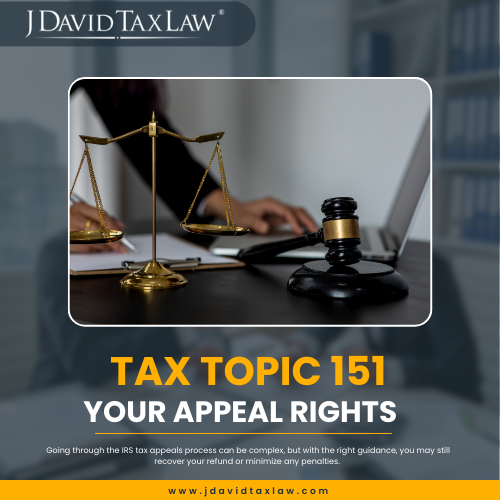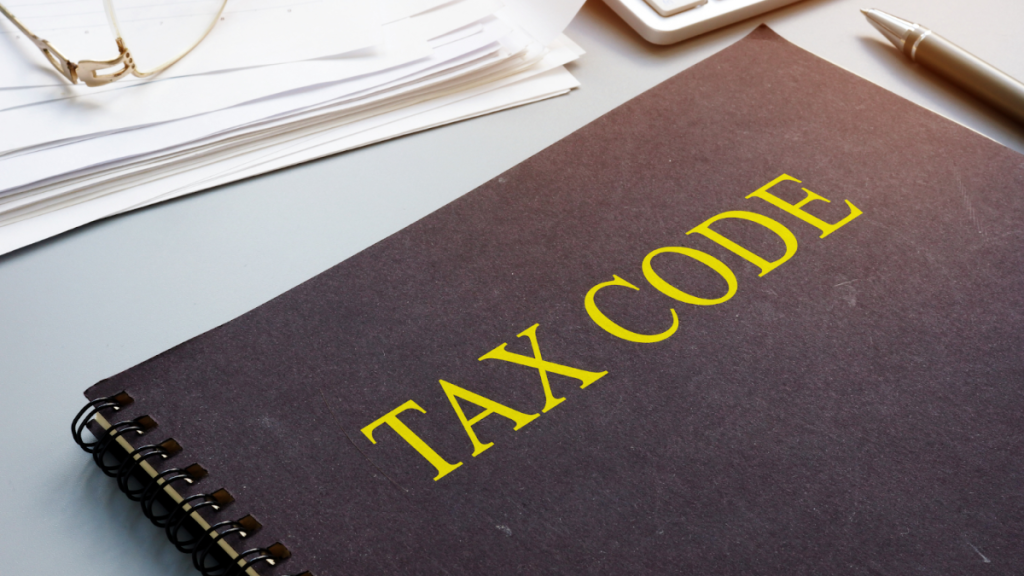When you’re eagerly expecting your tax refund, receiving a notice from the IRS instead can be a frustrating surprise. If you’ve encountered Tax Topic 151, it means the IRS is withholding part or all of your refund due to unpaid debts, errors, or other unresolved tax issues.
However, this doesn’t mean the situation is final. Understanding your rights and taking the necessary steps to appeal can make a significant difference in your outcome.
Going through the IRS tax appeals process can be complex, but with the right guidance, you may still recover your refund or minimize any penalties. This guide will walk you through the key steps to request appeals under Tax Topic 151 and explain how a tax appeals attorney can help you maximize your refund.
What is Tax Topic 151?
Tax Topic 151 is a notice from the IRS indicating that your tax refund has been partially or fully withheld. This often happens because of outstanding debts, such as back taxes, student loans, or child support. The IRS uses this notice to inform you that instead of receiving your refund, the amount is being applied to offset those obligations.
There are many reasons why the IRS may withhold your refund under Tax Topic 151. It could be due to unpaid federal or state taxes, non-tax debts, or even clerical errors on your tax return. However, this doesn’t mean you’re left without options. Tax Topic 151 also informs you of your right to appeal the decision, giving you an opportunity to dispute the withholding and potentially recover your refund.
Understanding why you received this notice and how to appeal is crucial to ensuring your rights are protected. Whether it’s a legitimate debt or a mistake, you have the right to challenge the IRS audit and work toward a resolution.
Your Right to Appeal: Understanding IRS Appeal Rights
If you receive a Tax Topic 151 notice, it’s important to know that you have the right to challenge the IRS’s decision through their tax appeals process. The IRS offers taxpayers a fair chance to dispute actions that may affect their refunds – whether it’s due to unpaid tax debts, errors, or other issues. By understanding your appeal rights, you can take proactive steps to resolve the matter and potentially recover your withheld refund.
There are two main ways to appeal: an informal appeal and a formal protest.
Informal appeals typically apply to smaller disputes, such as those involving amounts under $25,000. For these cases, you can use IRS Form 12203, which is designed for small case requests.
For larger disputes, you’ll need to submit a formal written protest, which involves providing more detailed information and documentation to support your claim.
Knowing which method to use and submitting the correct paperwork is essential to successfully challenging the IRS’s decision. This process can be overwhelming, but working with a J. David Tax Law appeals attorney can ensure that your appeal is properly prepared and filed, giving you the best chance at a positive outcome.
Steps to File an Appeal Against IRS Actions
If you’ve received a Tax Topic 151 notice and believe the IRS made an error or you have grounds to dispute the withholding, following the correct steps in the appeals process is essential. Here’s a breakdown of how to approach your IRS appeal:
1. Review the IRS Notice Carefully
The first step is to closely examine the details of the notice you received. The notice will explain why your refund was withheld and how much was applied to debts or other obligations. Be sure to check for any errors or discrepancies in the amount or the reason for withholding. The notice will also specify the deadline for filing your appeal, so it’s crucial to act promptly.
2. Prepare Your Appeal
Once you’ve reviewed the notice, it’s time to prepare your appeal. For disputes involving amounts under $25,000, you can submit IRS Form 12203, which is a simplified request for a small case appeal. For larger disputes, you’ll need to prepare a formal written protest. This protest should include your name, contact information, the tax years involved, a statement explaining why you disagree with the IRS’s decision, and any supporting documentation.
3. File Your Appeal
After preparing your appeal, submit it to the appropriate IRS office by the specified deadline. For smaller cases using IRS Form 12203, the form should be sent to the address provided in the notice. Formal written protests for larger disputes should follow the instructions provided by the IRS. Be sure to keep a copy of all documents you submit for your records.
4. Await a Response
Once your appeal is filed, the IRS Appeals Office will review your case. This process can take several weeks or even months, depending on the complexity of your case. During this time, it’s important to remain patient, but don’t hesitate to follow up if necessary. If the IRS agrees with your appeal, they may adjust the refund amount or reverse the withholding entirely.
For more details, you can read “Resolve IRS Audit Complaints Efficiently with J. David Tax Law” to learn how our tax audit attorneys resolve your case against the IRS.
Maximize Your Refund Appeal With a Tax Audit Attorney
Appealing an IRS decision under Tax Topic 151 is about more than reversing a withholding—it’s an opportunity to maximize your refund. With J. David Tax Law, you can strengthen your case and recover what’s rightfully yours. Here’s how we can help:
Strong Documentation
We’ll help gather and organize all necessary documentation to support your appeal, ensuring you provide the IRS with clear, verifiable proof to back your case.
Identifying Missed Opportunities
Our tax attorneys will review your return for any missed deductions or credits, such as the Earned Income Tax Credit (EITC), to increase your refund amount.
Expert Appeal Support
With our in-depth understanding of IRS procedures, our tax attorneys can guide you through the appeal process, maximizing your chances of success and securing the best possible refund.
If you need help to file an IRS appeal and to reinstate your rights, feel free to reach out our IRS audit attorneys.
Conclusion
Dealing with Tax Topic 151 can be overwhelming, but it doesn’t have to mean the end of your refund. By understanding your rights and filing an appeal, you can challenge the IRS’s decision and potentially recover your withheld funds. With J. David Tax Law by your side, you’ll have expert guidance throughout the appeals process, maximize your refund, and secure the financial outcome you deserve.
Don’t leave your refund on the table—contact (888) 342-9436 to talk with our experienced IRS audit lawyers to help you take the next steps toward a successful appeal.
Your Tax Relief Questions, Answered















